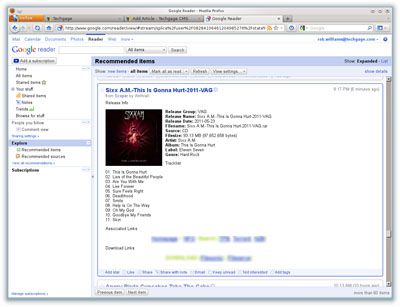- Qualcomm Launches Snapdragon 4 Gen 2 Mobile Platform
- AMD Launches Ryzen PRO 7000 Series Mobile & Desktop Platform
- Intel Launches Sleek Single-Slot Arc Pro A60 Workstation Graphics Card
- NVIDIA Announces Latest Ada Lovelace Additions: GeForce RTX 4060 Ti & RTX 4060
- Maxon Redshift With AMD Radeon GPU Rendering Support Now Available
Why Search for Piracy when Google Reader Hand-Delivers It?
Thanks to its ease-of-use and ability to store my RSS feeds in the “cloud”, I’ve been a long-time user of Google’s Reader aggregator, and have had little to complain about. But this past weekend, I encountered something a little unusual with the service – something that could be considered humorous for some, but a major problem for others.
When Google Reader is accessed with a Google account that has no RSS feeds associated with it, a default list of the top global feed entries is listed instead. This is a feature I’ve come to enjoy as it’s a great way to see cool and unique stories that I would not have otherwise spotted. But this weekend, I found myself discovering a lot more than a paralyzed man able to walk again and a hilarious rapture gag.
In perusing the feeds, I passed one written about a male enhancement drug, and though it was well-written, I decided to not waste my money again and continued along. I then passed a post with a movie cover and a quick blurb. At first, I thought it was a blog post – until I saw a couple of URLs where it could be downloaded.
Thinking that all of this was a fluke, I continued to peruse. It didn’t take too long before I realized that the default feed I was viewing was a great source of piracy, with one out of every eight posts at least containing a direct link to pirated materials. Could these posts just be cheap ploys for some ad views? Not so. I indulged and clicked on one, and proceeded straight through to the download page. Yup, I was downloading a piece of pirated software, one that Google Reader hand-delivered me.
Here are a couple of other examples.
I didn’t finish the download, so I can’t state without a doubt that it was indeed usable, but given that the filesize was where I thought it should be, I am confident it was real. As I continued to look through this feed, I found lots of books and magazines being linked to, as well as software, music, movies and also some games (mostly casual).
It became clear to me that Google’s Reader had either been hacked, or that some clever beings found out how to circumvent the process of making a feed post popular. But, then I wasn’t so sure. I logged into another Google account that had no feeds present, and I didn’t see these posts, and the same applies for the main Google account I use, where clicking on the “Explore” option yielded no such results either.
It’s a well-known fact that Google has a lot of information on its users, so I began to wonder if somehow, there was a trace of something that tied that particular account to piracy, and it was only with this sort of event where I noticed. Also in the feed was a link to a story about the lead singer of my favorite band, and as the subject isn’t exactly too thrilling, I can’t imagine it’s one that would appear in the general feed.
Could Google have connected that account to piracy when I visited a site like The Pirate Bay? Only Google would be able to answer that. But it does seem so, and I’m sure I’m not alone in being able to see results like these. If you have a Google account and no feeds in Reader, go and check it out. You may be surprised.
For the sake of being clear, I am not endorsing piracy whatsoever. It’s not something I agree with, and developers should be compensated for their work – it’s that simple.





